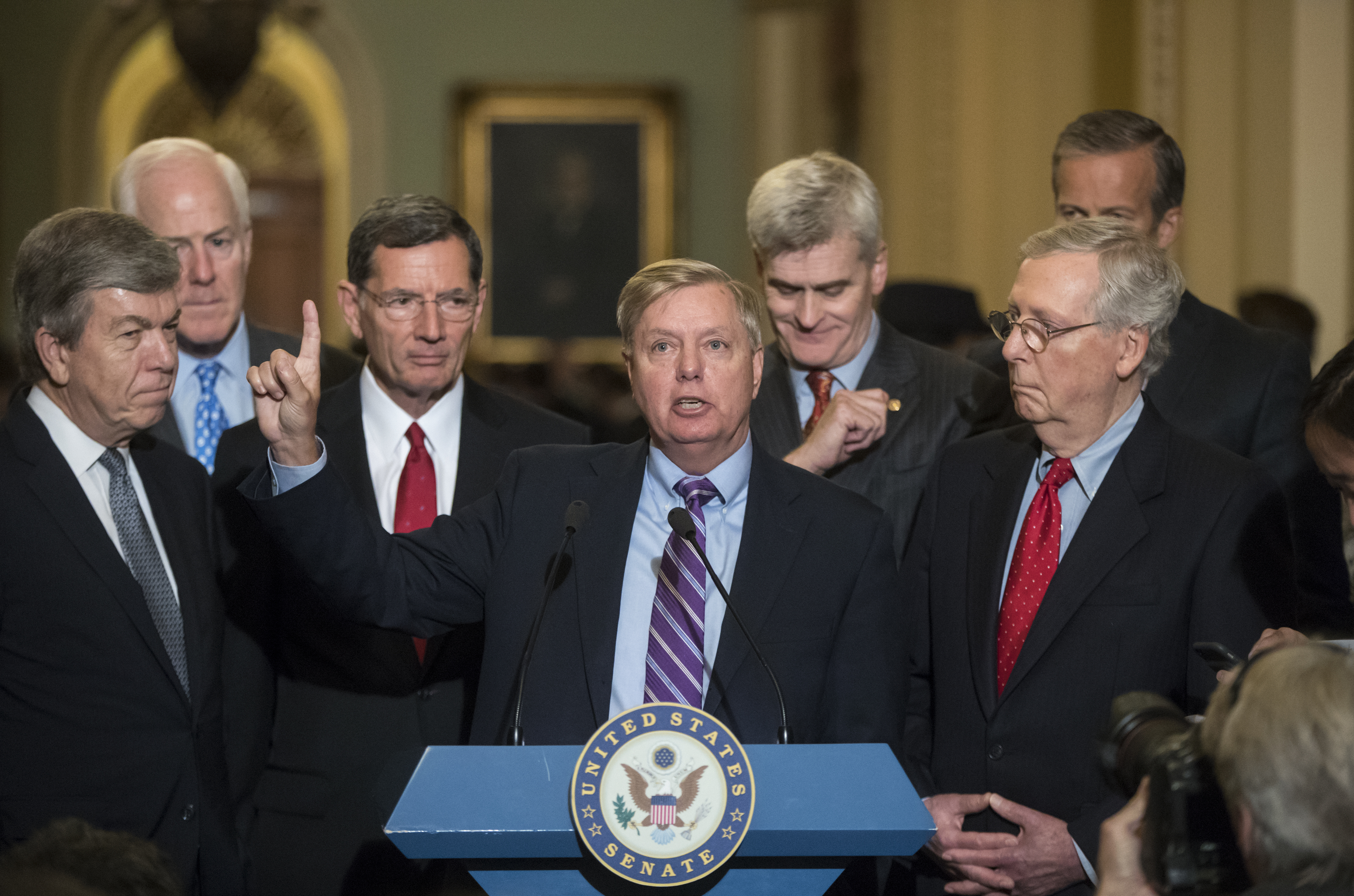Republicans are lost in the wilderness on health-care policy
Republicans have no idea what a conservative health-care system would even do


A free daily email with the biggest news stories of the day – and the best features from TheWeek.com
You are now subscribed
Your newsletter sign-up was successful
The cynical explanation for Sen. Lindsey Graham's warning last weekend that failure to repeal the Affordable Care Act would mean the eventual enactment of "BernieCare" and "single-payer socialism" is that he was trying to whip up the rubes. Graham was speaking on Breitbart's Patriot Channel on satellite radio, after all; he wasn't talking soberly about public-policy alternatives.
"This is not about repealing and replacing ObamaCare. This is about stopping a march towards socialism," Graham said with bellicosity.
But sadly, there's reason to believe Graham actually believes the nonsense he's spewing. Indeed, when it comes to health-care policy, his entire party seems dazed and confused.
The Week
Escape your echo chamber. Get the facts behind the news, plus analysis from multiple perspectives.

Sign up for The Week's Free Newsletters
From our morning news briefing to a weekly Good News Newsletter, get the best of The Week delivered directly to your inbox.
From our morning news briefing to a weekly Good News Newsletter, get the best of The Week delivered directly to your inbox.
"Let's just get to the heart of the matter: If you're not for this, then you really go to wonder whether or not you're a Republican because the Republican philosophy is the government closest to the people is the best government," Graham continued, limning a tranquil future in which socialism-eschewing residents of red states like South Carolina will be able to complain to their governor and statehouse representatives — you know, the same folks who oversee the DMV — about the quality of their health care.
Graham's brave-new-laboratory approach to health care, and its blithe Jeffersonian romanticization, is indicative of the biggest problem Republicans have in their quest to repeal ObamaCare: They know what they're against — "Socialism!" — but they don't actually know what they're for. Or, put another way, they don't know what what they're for would actually do. As Jonathan Chait writes: "[I]f state-based health-care regulation creates a paradise of universal coverage and low rates, then nobody will have much incentive to change it. But Republicans have zero examples of any such experiment working, and no reason to believe that lower funding levels will do anything other than reduce the amount of care."
Now, this isn't completely fair; health-care policy intellectuals on the right do point to the Medicare Advantage and prescription drug programs as precedents for the success of blending federal funding with the private insurance marketplace. (Others are quite open about their opposition to universal coverage as a worthy goal in the first place.) But these are still federally run programs, and Chait is broadly right about the lack of evidence for the magical thinking that underpins Republicans' philosophy of block-granting money to states.
This is primarily a problem of ideology existing in a bubble. In the earliest days of what Claremontian conservatives pompously call the "administrative state," there was a status quo in which one could reasonably identify as a "free market." Before there were laws — state laws, even! — limiting the amount of hours an employee could work in a bakery, there were … no laws limiting the amount of hours an employee could work in a bakery.
A free daily email with the biggest news stories of the day – and the best features from TheWeek.com
In the health-care arena, there is no such Edenic paradise of silent law. We start with the gigantic accident of insurance tied to your job, and then we work our way into a crazy quilt of payroll tax-financed social insurance (Medicare) for the elderly and a separate but related federal-state hybrid program to cover the indigent (Medicaid). The bill that Graham is now championing along with Sen. Bill Cassidy (R-La.) essentially overhauls one of these programs (Medicaid) to give states more flexibility to spend less money.
The Cassidy-Graham proposal is not a minor change to current law by any stretch. But it hardly ushers in a new era of market-based health insurance; "states" are not synonymous with markets, and governors do not run businesses. To an extent, it devolves responsibility for policy outcomes from one level of government to another — and perhaps that will lead to better health outcomes and equally broad coverage (I remain skeptical).
Such changes do not restore the power of Adam Smith's "invisible hand." They merely change the grip of a still highly visible hand of government. In their never-say-die zeal to repeal ObamaCare, Republicans aren't marching in the opposite direction of socialism. They're not even marching on a different base. At best, they're sleeping in separate barracks.
Scott Galupo is a freelance writer living in Virginia. In addition to The Week, he blogs for U.S. News and reviews live music for The Washington Post. He was formerly a senior contributor to the American Conservative and staff writer for The Washington Times. He was also an aide to Rep. John Boehner. He lives with his wife and two children and writes about politics to support his guitar habit.
-
 Local elections 2026: where are they and who is expected to win?
Local elections 2026: where are they and who is expected to win?The Explainer Labour is braced for heavy losses and U-turn on postponing some council elections hasn’t helped the party’s prospects
-
 6 of the world’s most accessible destinations
6 of the world’s most accessible destinationsThe Week Recommends Experience all of Berlin, Singapore and Sydney
-
 How the FCC’s ‘equal time’ rule works
How the FCC’s ‘equal time’ rule worksIn the Spotlight The law is at the heart of the Colbert-CBS conflict
-
 The billionaires’ wealth tax: a catastrophe for California?
The billionaires’ wealth tax: a catastrophe for California?Talking Point Peter Thiel and Larry Page preparing to change state residency
-
 Bari Weiss’ ‘60 Minutes’ scandal is about more than one report
Bari Weiss’ ‘60 Minutes’ scandal is about more than one reportIN THE SPOTLIGHT By blocking an approved segment on a controversial prison holding US deportees in El Salvador, the editor-in-chief of CBS News has become the main story
-
 Has Zohran Mamdani shown the Democrats how to win again?
Has Zohran Mamdani shown the Democrats how to win again?Today’s Big Question New York City mayoral election touted as victory for left-wing populists but moderate centrist wins elsewhere present more complex path for Democratic Party
-
 Millions turn out for anti-Trump ‘No Kings’ rallies
Millions turn out for anti-Trump ‘No Kings’ ralliesSpeed Read An estimated 7 million people participated, 2 million more than at the first ‘No Kings’ protest in June
-
 Ghislaine Maxwell: angling for a Trump pardon
Ghislaine Maxwell: angling for a Trump pardonTalking Point Convicted sex trafficker's testimony could shed new light on president's links to Jeffrey Epstein
-
 The last words and final moments of 40 presidents
The last words and final moments of 40 presidentsThe Explainer Some are eloquent quotes worthy of the holders of the highest office in the nation, and others... aren't
-
 The JFK files: the truth at last?
The JFK files: the truth at last?In The Spotlight More than 64,000 previously classified documents relating the 1963 assassination of John F. Kennedy have been released by the Trump administration
-
 'Seriously, not literally': how should the world take Donald Trump?
'Seriously, not literally': how should the world take Donald Trump?Today's big question White House rhetoric and reality look likely to become increasingly blurred
